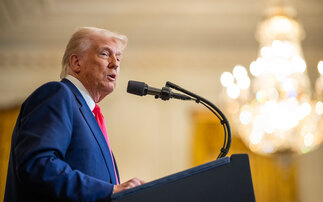Have plastics become the way politicians avoid talking about climate change?
There was a briefest flickering moment during Philip Hammond's Budget address today when it felt as if he might say something important, something existentially important.
"We are driven by a determination to ensure that the next generation will be more prosperous than ours," he said, his monotone shifting slightly to emphasise the noble intent, to indicate the gravity of the situation. "But we cannot secure our children's future unless we secure our planet's future," he added.
Could it be the Chancellor was about to acknowledge the all-consuming urgency of the climate change threat? Could he finally be ready to harness the cross-party desire to make the UK a world leader in the transition to a cleaner, healthier, green economy? Was the failure to mention clean technologies earlier in the speech simply a precursor for an impassioned hymn to their civilisation-saving importance?
No. His stated desire to bequeath the next generation a functioning biosphere was simply the set up for a joke about how the Shadow Chancellor fell over some fly-tipping.
The environmental section of the UK government's annual economic set piece - a speech delivered just weeks after the world's scientific warned we have a few decades to build a globally decarbonised economy or risk an epoch shaping disaster - amounted to £10m for tackling abandoned waste, a promise to reform packaging recovery notes, a rejection of calls for a 'latte levy', and a pledge to introduce a new tax on plastic. Elsewhere there was a freeze on fuel duty, yet more money for road-building, and further tax breaks for the oil and gas industry. Mentions of climate change came there none.
As one wag observed on Twitter "plastics has become the way politicians ignore climate change".
Plastics has become the way politicians ignore climate change
— LDNCalling (@LDNCalling) October 29, 2018
In fairness, the prospect of a new plastic tax, albeit one subject to consultation is a welcome move and the waste and recycling industry was quick to recognise its potential. However, as always the devil will be in the detail, and industry insiders were equally swift to warn that any tax needs to come with meaningful R&D investment and structural reform across the sector if a genuine circular economy is to materialise. It remains to be seen if a single tax can "transform the economics of sustainable packaging" as Hammond promised, especially when recycling rates have stalled and the sector remains dogged by under-investment - under-investment, lest we forget, that has proceeded throughout eight years of Conservative-led government.
In truth, a putative tax on plastic packaging that does not contain at least 30 per cent recycled content feels like the answer to the question 'how little can I do and still convince people I care about the environment?' In the face of the epic challenge of decarbonising the global economy, it is a case of shuffling the plastic cutlery on the Titanic.
What then of the environmental measures hidden in the Red Book? Were there grounds for encouragement to be found there? Well, yes and no.
There was new funding for air quality, flood resilience, and tree planting, as well as an intriguing call for the National Infrastructure Commission to analyse the wider preparedness of the UK economy to climate threats. But the sums involved - £20m here, £13m there, £15m for trees - were dwarfed by the new cash for road-building and the latest tax breaks for North Sea oil and gas.
There was a hike in the Climate Change Levy, a call for evidence on how to help small businesses improve their energy efficiency, and a new £315m Industrial Energy Transformation Fund. But again, businesses have been waiting over a year since the unveiling of the Clean Growth Strategy for clarity on the government's energy efficiency plans and they are still not actually finalised. Moreover, Labour was quick to point out the £315m fund is to be paid for, at least in part, by axing existing Enhanced Capital Allowance tax breaks for companies that undertake energy efficiency upgrades.
Worse still, the promise to freeze the carbon price levy at its current level until at least 2021 and the plan for a new Carbon Emissions Tax if the UK does leave the EU emissions trading scheme as part of a no deal Brexit provided little additional clarity for clean energy investors and raises the prospect of a revival in coal power if gas prices remain relatively high. The government has been warned of this risk for months now. It chose not to act with the clarity that was required and as such an increase in UK coal emissions remains a distinct possibility.
As the Guardian's Adam Vaughan observed:
For all those who asked a few weeks ago what effect the IPCC 1.5C report will have on governments and policy, the UK's answer in #budget2018 was clear: jack all.
— Adam Vaughan (@adamvaughan_uk) October 29, 2018
Even the Conservative Environment Network, which recently launched a new caucus of green Tory MPs, was left underwhelmed, with its director Sam Richards declaring that it was a "disappointing Budget for the environment". "Carbon price uncertainty will stall investment in clean technologies," he added. "There was no mention of the economic opportunity from - or a route to market for - cheap renewable power, and no money to upgrade leaky housing stock or new standards to future proof new homes."
These absences were disappointing, but what was truly alarming about this year's Budget was the political choice that both Hammond and Theresa May have now made in side-lining climate change from big agenda-setting speeches.
The reality is the government does have a story to tell on climate action. It has a track record of sustained emissions reduction and record clean energy investment, it has rising clean tech R&D spend and a genuinely world-leading engineering base, it has bold Green Brexit plans and has just launched a review on whether to become one of the first countries in the world to set a net zero emissions target. And yet neither May in her conference speech nor Hammond in his Budget wanted to highlight these achievements, just as neither of them wanted to deliver some of the obvious, cost effective and largely popular new policies that would unlock the next phase of green economic development. The big question is why? Where does this reticence come from?
There are two possible explanations: one generous, the other damning.
The first is that the government thinks it is best served by trying to deliver green progress and deep decarbonisation below the radar. 'There is no point antagonising those colleagues and media outlets who remain hostile to the green agenda, especially when the party remains so divided on other issues,' Ministers privately mutter. 'We've made good progress to date without overtly politicising things and let's keep it that way. Steady, incremental improvements are gathering pace, especially as more and more green-minded businesses step up investments in sustainability. And besides, those voters who prioritise environmental action will always lean towards the Greens and Labour, there is little to be gained from fighting on their turf.'
This rationale explains the decision to reject calls for a latte levy even when the Daily Mail is on board, just as it explains the repeated deferral of any and all decisions that could be spun as adding to green levies on energy bills.
The problem is that this approach, if it ever worked, is fast running out of road. The Conservatives can't keep ceding ground to Labour on any topic that engages people under 40 and expect to command a majority. Moroever, the next phase of decarbonisation will have a bigger impact on peoples' lives. From EV infrastructure and aviation emissions to negative emissions technologies and green heat, it requires serious infrastructure investment, long term policy clarity, and public consent. The results would be net positive, but it is hard to see how it can be done on the down low.
Which brings us to the less generous explanation for the government's failure to make its Green Brexit and Clean Growth strategies more central to its positioning. If it looks like it is not fully committed to this agenda perhaps that is because it is not fully committed to this agenda.
The most obvious explanation for the failure to make more of the government's green plans is because May and Hammond want to reserve the freedom to ditch them if need be, either to appease the ideologues in their party or to pursue a high carbon growth strategy. It is that which would explain Hammond's hinting at the prospect of an alternative low tax, deregulatory growth model, just as it would explain the Treasury's reported opposition to a properly robust post-Brexit green watchdog and May's refusal to smack down those Ministers who keep saying they favour chlorinated chicken trade deals and environmental regulation-torching reforms.
This equivocation increases the cost of capital for critical low carbon infrastructure, undermines one of the UK's few growth sectors (something you would think Hammond would want to nurture given today's anaemic growth forecasts) and hampers competitiveness in the global low carbon transition. But all that is seen as secondary to the ideological small state instinct and the desire to keep options open and certain vested interests on side.
The Chancellor said today that "we cannot secure our children's future unless we secure our planet's future". He's right, so why then is he doing so little to secure that future? Why is he continuing to actively work to destabilise the planet and the long term viability of the global economy by pursuing high carbon and unsustainable policies? The problem for Hammond and co is that in the wake of the IPCC report this continued political timorousness in the face of the climate crisis is not simply disappointing, it is a genuine dereliction of duty.
This article first appeared in the BusinessGreen Overnight Briefing, which is available to all subscribers









